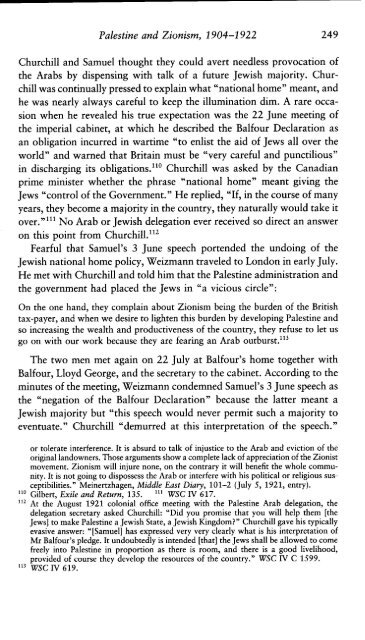Churchill, Palestine and Zionism, 1904-1922 - Douglas J. Feith
Churchill, Palestine and Zionism, 1904-1922 - Douglas J. Feith
Churchill, Palestine and Zionism, 1904-1922 - Douglas J. Feith
You also want an ePaper? Increase the reach of your titles
YUMPU automatically turns print PDFs into web optimized ePapers that Google loves.
<strong>Palestine</strong> <strong>and</strong> <strong>Zionism</strong>, <strong>1904</strong>-<strong>1922</strong> 249<br />
<strong>Churchill</strong> <strong>and</strong> Samuel thought they could avert needless provocation of<br />
the Arabs by dispensing with talk of a future Jewish majority. <strong>Churchill</strong><br />
was continually pressed to explain what "national home" meant, <strong>and</strong><br />
he was nearly always careful to keep the illumination dim. A rare occasion<br />
when he revealed his true expectation was the 22 June meeting of<br />
the imperial cabinet, at which he described the Balfour Declaration as<br />
an obligation incurred in wartime "to enlist the aid of Jews all over the<br />
world" <strong>and</strong> warned that Britain must be "very careful <strong>and</strong> punctilious"<br />
in discharging its obligations yo <strong>Churchill</strong> was asked by the Canadian<br />
prime minister whether the phrase "national home" meant giving the<br />
Jews "control of the Government." He replied, "If, in the course of many<br />
years, they become a majority in the country, they naturally would take it<br />
over."l11 No Arab or Jewish delegation ever received so direct an answer<br />
on this point from <strong>Churchill</strong>. 112<br />
Fearful that Samuel's 3 June speech portended the undoing of the<br />
Jewish national home policy, Weizmann traveled to London in early July.<br />
He met with <strong>Churchill</strong> <strong>and</strong> told him that the <strong>Palestine</strong> administration <strong>and</strong><br />
the government had placed the Jews in "a vicious circle":<br />
On the one h<strong>and</strong>, they complain about <strong>Zionism</strong> being the burden of the British<br />
tax-payer, <strong>and</strong> when we desire to lighten this burden by developing <strong>Palestine</strong> <strong>and</strong><br />
so increasing the wealth <strong>and</strong> productiveness of the country, they refuse to let us<br />
go on with our work because they are fearing an Arab outburst. ll3<br />
On the one h<strong>and</strong>, they complain about <strong>Zionism</strong> being the burden of the British<br />
tax-payer, <strong>and</strong> when we desire to lighten this burden by developing <strong>Palestine</strong> <strong>and</strong><br />
so increasing the wealth <strong>and</strong> productiveness of the country, they refuse to let us<br />
go on with our work because they are fearing an Arab outburst. ll3<br />
The two men met again on 22 July at Balfour's home together with<br />
Balfour, Lloyd George, <strong>and</strong> the secretary to the cabinet. According to the<br />
minutes of the meeting, Weizmann condemned Samuel's 3 June speech as<br />
the "negation of the Balfour Declaration" because the latter meant a<br />
Jewish majority but "this speech would never permit such a majority to<br />
eventuate." <strong>Churchill</strong> "demurred at this interpretation of the speech."<br />
or tolerate interference. It is absurd to talk of injustice to the Arab <strong>and</strong> eviction of the<br />
original l<strong>and</strong>owners. Those arguments show a complete lack of appreciation of the Zionist<br />
movement. <strong>Zionism</strong> will injure none, on the contrary it will benefit the whole community.<br />
It is not going to dispossess the Arab or interfere with his political or religious susceptibilities."<br />
Meinertzhagen, Middle East Diary, 101-2 (July 5, 1921, entry).<br />
110 Gilbert, Exile <strong>and</strong> Return, 135. 111 WSC IV 617.<br />
112 At the August 1921 colonial office meeting with the <strong>Palestine</strong> Arab delegation, the<br />
delegation secretary asked <strong>Churchill</strong>: "Did you promise that you will help them [the<br />
Jews) to make <strong>Palestine</strong> a Jewish State, a Jewish Kingdom?" <strong>Churchill</strong> gave his typically<br />
evasive answer: "[Samuel) has expressed very very clearly what is his interpretation of<br />
Mr Balfour's pledge. It undoubtedly is intended [that) the Jews shall be allowed to come<br />
freely into <strong>Palestine</strong> in proportion as there is room, <strong>and</strong> there is a good livelihood,<br />
provided of course they develop the resources of the country." WSC IV C 1599.<br />
113 WSC IV 619.


